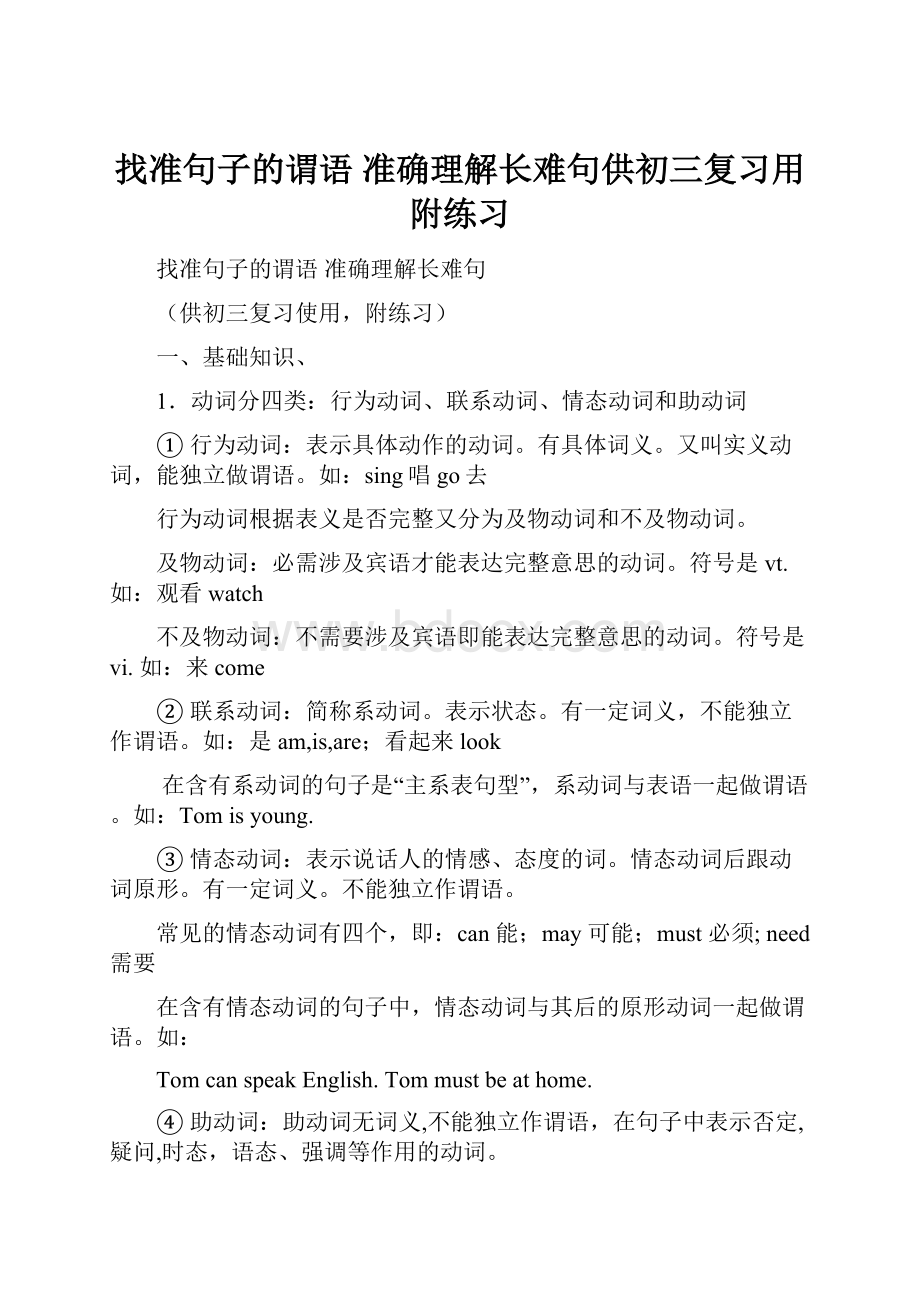找准句子的谓语准确理解长难句供初三复习用附练习.docx
《找准句子的谓语准确理解长难句供初三复习用附练习.docx》由会员分享,可在线阅读,更多相关《找准句子的谓语准确理解长难句供初三复习用附练习.docx(23页珍藏版)》请在冰豆网上搜索。

找准句子的谓语准确理解长难句供初三复习用附练习
找准句子的谓语准确理解长难句
(供初三复习使用,附练习)
一、基础知识、
1.动词分四类:
行为动词、联系动词、情态动词和助动词
①行为动词:
表示具体动作的动词。
有具体词义。
又叫实义动词,能独立做谓语。
如:
sing唱go去
行为动词根据表义是否完整又分为及物动词和不及物动词。
及物动词:
必需涉及宾语才能表达完整意思的动词。
符号是vt.如:
观看watch
不及物动词:
不需要涉及宾语即能表达完整意思的动词。
符号是vi.如:
来come
②联系动词:
简称系动词。
表示状态。
有一定词义,不能独立作谓语。
如:
是am,is,are;看起来look
在含有系动词的句子是“主系表句型”,系动词与表语一起做谓语。
如:
Tomisyoung.
③情态动词:
表示说话人的情感、态度的词。
情态动词后跟动词原形。
有一定词义。
不能独立作谓语。
常见的情态动词有四个,即:
can能;may可能;must必须;need需要
在含有情态动词的句子中,情态动词与其后的原形动词一起做谓语。
如:
TomcanspeakEnglish.Tommustbeathome.
④助动词:
助动词无词义,不能独立作谓语,在句子中表示否定,疑问,时态,语态、强调等作用的动词。
常见的有四类,即:
be(am,is,are等);will,shall;have(has,had);do,(does,did)
含有助动词的句子中,助动词与其它动词的相应形式一起一构成谓语。
如:
TomisreadingEnglish.TomwillspeakEnglish.
Tomhasfinishedhishomework.Tomdoesn’tspeakEnglish.
2.动词的基本词形变化:
英语中的动词有五种词形变化,分别是:
现在式、过去式、不定式、现在分词和过去分词。
①动词的现在式包含原形与单三形式两种形式
动词原形:
动词的原始形式或字典中的形式。
动词原形可以独立做谓语。
如:
work
动词的单三形式:
在动词原形后加s或es构成。
动词的单三形式也可以独立做谓语。
如:
works.
(规则变化与名词单数变复数规则相同,特殊的:
如:
have-has;do-does;go-goes)
②动词的过去式:
规则变化的动词的过去式,在动词原形后加-ed构成,动词的过去式也可以独立做谓语。
如:
worked.不规则的需单独记,如:
see-saw
③动词的过去分词:
在动词原形后加-ed构成,过去分词不能独立作谓语。
规则变化与过去式相同,不规则的需单独记,如:
see-seen
④动词不定式:
“to+动词原形”构成,不能独立做谓语。
如:
go→togoread→toread
⑤动词的ing形式(V-ing):
在动词原形后加ing构成。
动词的ing形式不能独立作谓语。
如:
read-reading
注意:
动词不论形式如何变化,但词义不变
原形单三过去式不定式v-ing过去分词
watchwatcheswatchedtowatchwatchingwatched
gogoeswenttogogoinggone
我们还知道,动词在句子中可作各种成分,作谓语时统称谓语形式,不做谓语时统称非谓语形式,
二、动词的谓语形式
动词的谓语形式:
动词作谓语时的形式。
动词做谓语时,有时态、语态、等变化。
也可以与情态动词连用。
还必需与主语保持一致。
1.谓语动词的时态:
→体现出谓语动作发生的大至时间。
用动词的不同形式来表示动作发生在不同的时间.常见的十一种时态及构成分别是:
时态
一般现在时:
一般过去时:
现在时行时:
过去进行时:
一般将来时:
过去将来时:
现在完成时:
过去完成时:
构成
动词原形或单三形式
动词过去式
am(is,are)+v-ing
was(were)+v-ing
shall/will+动词原形
should/would+动词原形
have/has+过去分词
had+过去分词
例句
句中的黑体部分是谓语
Tomcleanstheroom.
Tomcleanedtheroom.
Tomiscleaningtheroom.
Tomwascleaningtheroom.
Tomwillcleantheroom.
Tomwouldcleantheroom.
Tomhascleanedtheroom.
Tomhadcleanedtheroom.
注意:
一般现在时与一般过去时的肯定句改否定句与一般疑问句需要用助动词do、does或did,如:
Tomcleanstheroom.→Tomdoesn’tcleantheroom.
→DoesTomcleantheroom?
Youcleantheroom.→Youdon’tcleantheroom.句中的黑体部分是谓语
→Doyoucleantheroom?
Tomcleanedtheroom.→Tomdidn’tcleantheroom.
→DidTomcleantheroom?
2.谓语动词的语态:
→体现句子的主语是动作的执行者,还是承受者。
主语是动作执行者的句子叫主动语态。
如,上面的例子
主语是动作承受者的句子叫被动语态。
比较下面两个句子:
Tomcleanstheroomeveryday.→主动语态
TheroomiscleanedbyTomeveryday.→被动语态
被动语态的构成是:
be+过去分词,其中的有时态,人称数的变化,观察下面的例子。
TheroomiscleanedbyTomeveryday.
TheroomsarecleanedbyTomeveryday.
TheroomwascleanedbyTomeyesterday.
TheroomwillbecleanedbyTomtomorrow.句中的黑体部分是谓语
TheroomisbeingcleanedbyTomnow.
TheroomhasbeencleanedbyTomalready.
TheroomhadbeencleanedbyTombeforeclass..
TheroomcanbecleanedbyTom.
3.谓语形式:
“情态动词+动词原形”:
→体现说话者说话时的情感态度。
如:
IspeakEnglish.我讲英语。
IcanspeakEnglish.我会讲英语。
ImustspeakEnglish.我必须讲英语。
IhavetospeakEnglish.我不得不讲英语。
YoushoudspeakEnglish.你应该讲英语。
YoumayspeakEnglish.你可以讲英语。
Youneedn’tspeakEnlish.你不需要讲英语。
Idaren’tspeakEnglish.我不敢讲英语。
4.谓语形式:
“do,does或did+动词原形”→体现说话者对谓语的强调。
如:
Docomeearly.一定早点来.
HedoesknowBeijingwell.他的确熟悉北京.
Hedidtellmeaboutityesterday.他昨天的确告诉了我这件事.
三、动词的非谓语形式
动词在句子中也可做谓语外的其它成分,如:
主语、宾语、表语、宾补、定语和状语。
统称非谓语成分。
1、动词做非谓语时,使用的形式叫非谓语形式。
有三种:
不定式、V-ing形式、V-ed形式
不定式:
“to+动词原形”构成,不定式可以跟宾语或状语等,构成不定式短语。
如:
go→togo→togohomeread→toread→toreadEnglishathome
动词原形不定式不定式短语动词原形不定式不定式短语
V-ing:
在动词原形后加ing构成。
ing形式可以跟宾语或状语等,构成ing短语。
如:
read→reading→readingEnglishwatch→watchingTV→watchingTVathomeintheevening
动词原形V-ingV-ing短语动词原形V-ingV-ing短语
过去分词:
在动词原形后加-ed构成,规则变化与过去式相同,不规则的需单独记,
过去分词可以跟宾语或状语等,构成V-ed短语。
如:
give→given→givenmoretimewrite→written→writtenbyTom
动词原形V-edV-ed短语动词原形V-edV-ed短语
2.动词三种非谓语形式的本质区别:
不定式:
表将来,表目的、表原因、表全过程;V-ing:
表主动、表进行、表动作这回事;V-ed:
表被动、表完成
Iwanttogohome.(表将来)
IcomeheretostudyEnglish.(表目的)
Iamsorrytohearthat.(表原因)
IoftenseeTomplayfootballthere.(表全过程)
IseeTomgoingintotheroom.(表进行)
Swimmingisgoodforus.(表动作这回事)
Americaisadevelopedcountry.(表完成)
TomreadabookwrittenbyLuXun.(表被动)
3.几个相关术语:
①带疑问词的不定式:
疑问词+不定式如:
whattodohowtoarrivetherewhentofinishit
②非谓语形式的逻辑主语:
即,非谓语动词动作的执行者。
一般为句子的主语或宾语。
如:
Wehavealotofworktodo.(主语we是的todo逻辑主语)
Iwantyoutodothework.(宾语you是的todothework逻辑主语)
Hearingthenews,hecan’thelpcrying.(主语he是的Hearing逻辑主语)
有时非谓语动词需要自带逻辑主语,即通常用下面方法:
不定式:
for+名词或代词,放在不定式前:
如:
forTomtogotoschoolformetohavelunch
v–ing:
一般用物主代词或名词所有格,放在v-ing前:
如:
Tom’scominghiscoming
V-ed:
一般用名词或代词,放在v-ed前:
如:
questionsettled
③非谓语动词的否定形式:
通常是就在非谓语动词之前加 not 或 never,如:
nottomakeanoisenothavingfinishedhiswork
注意:
当前面有逻辑主语时,not要放在逻辑主语与非谓语动词之间。
如:
yournothavingnoticedJenny’snothavingbeentrainedasadancer
特别提示:
一个句子只有一个谓语,谓语只能由动词充当。
因此,在一个句子中,若只有一个动词,此动词一定是谓语。
若有两个或多动词,会出现两种情况:
1)两动词都是谓语动词形式,此时两个谓语动词之间必有连词,或并列连词,或从属连词;
2)两动词中必有非谓语,此时两动词之间没有连词。
如:
Thenovelwrittenbyhimisverypopular.Thereisapurselyingontheground.
Thenovelwhichwaswrittenbyhimisverypopular.(which是连词)
Thereisapursethatislyingontheground.(that是连词)
Ourcomingmadehimhappy.(句中无连词,make是谓语,coming是非谓语形式。
简单句)
Wehadcomeandthatmadehimhappy.(make和come都用了谓语动词形式,有连词and,并列句)
Thatwehadcomemadehimhappy.(make和come都用了谓语动词形式,有连词that,复合句)
Wehadcome,whichmadehimhappy.(make和come都用了谓语动词形式,有连词which,复合句)
练习:
一.说出下列动词形式的名字
1.write
2.writing
3.waswriting
4.willwrite
5.havewritten
6.written
7.forhimtowrite
8.willbewritten
9.wrote
10.waswritten
11.howtodoit
12.nottowrite
13.iswritten
14.iswriting
15.wouldwrite
16.writes
17.hercoming
18.isbeingwritten
19.towrite
20.hadwritten
二、朗读下列句子,体会不同的谓语形式在表达意思方面的差异。
第一组1.Tomcleanstheroom.
2.Tomcleanedtheroom.
3.Tomiscleaningtheroom.
4.Tomwascleaningtheroom.
5.Tomwillcleantheroom.
6.Tomwouldcleantheroom.
7.Tomhascleanedtheroom.
8.Tomhadcleanedtheroom.
第二组1.TheroomiscleanedbyTomeveryday.
2.TheroomsarecleanedbyTomeveryday.
3.TheroomwascleanedbyTomyesterday.
4.TheroomwillbecleanedbyTomtomorrow.
5.TheroomisbeingcleanedbyTomnow.
6.TheroomhasbeencleanedbyTomalready.
7.TheroomhadbeencleanedbyTombeforeclass..
8.TheroomcanbecleanedbyTom.
第三组
1.Docomeearly.
2.Hemaycomein.
3.Hemaynotcomein.
4.Heneedn’tdothat.
5.Hedoesn’tswim.
6.Don’tcomeearly.
7.HemustbeTom.
8.Hecan’tbeTom.
9.Hecanswim.
10.Hecan’tswim.
11.Youhavetostayathome.
12.Hedoesn’tknowBeijingwell.
13.HedoesknowBeijingwell.
14.Hemustgohomerightnow.
15.Youdon’thavetostayathome.
16.Hedidn’ttellmeaboutityesterday.
17.Hedidtellmeaboutityesterday.
18.Hemustn’tgohomerightnow.
19.Youhadbetterfinishyourhomeworkfirst.
20.Youhadbetternotfinishyourhomeworkfirst.
三、指出下列句中主语和谓语动词,并判断是何种动词形式做谓语。
1.Ourschoolisnotfarfrommyhome.
2.Hebrokeapieceofglass.
3.Iloveyoumorethanher,child.
4.Theypushedthedooropen.
5.Teesturngreenwhenspringcomes.
6.Hewrotecarefullysomeletterstohisfriends.
7.Gobackwhereyoucamefrom.
8.Atlasthegothome,tiredandhungry.
9.Wouldyoupleasepassmethecup?
10.Maryhandedherhomeworktotheteacher.
11.Doyouknowthelatestnewsabouthim?
12.Iwillbetwenty-twoyearsoldnextyear.
13.Idon'tlikethepictureonthewall.
14.Tomdidn'tdohishomeworkyesterday.
15.Wehadbettersendforadoctor.
16.Whomdidyougivemybookto?
17.Whenyoucalled,Iwaseating.
18.Shehasbecomeateacher.
19.Wehavevisitedyourschoolbefore
20.Mybrotherhasn'tdonehishomework.
21.PeopleallovertheworldspeakEnglish.
22.Myhomeworkhasbeenfinishedbyme.
23.ThezoowillbevisitedbymeonSunday.
24.Theymadehimmonitoroftheclass.
25.Youwillfinditusefulafteryouleaveschool.
26.Doyouusuallygotoschoolbybus?
27.Theoldmanwasfeelingverytired.
28.Theleaveshaveturnedyellow.
29.SoonTheyallbecameinterestedinthesubject.
30.Allofusconsideredhimhonest.
31.Sheshowedushermanyofherpictures.
32.Theoldmanlivesalonelylife.
33.Wewillmakeourschoolmorebeautiful.
34.Hedidn'tcome.Thatiswhyhedidn'tknow.
35.Mygrandfatherboughtmeapairofsportsshoes.
36.Hemadeitclearthathewouldleavethecity.
37.Grandmatoldmeaninterestingstorylastnight.
38.Allthestudentsthinkhighlyofhisteaching
39.Iamgoingtobuysomethingtomorrow.
40.Weneedaplacetwicelargerthanthisone.
41.
Didthetwinshaveporridgefortheirbreakfast?
42.Howmanynewwordsdidyoulearnlastclass?
43.TheywerewatchingTVwhenthelightswentout.
44.Youmustpaygoodattentiontoyourpronunciation.
45.Therewillbeameetingatthelibrarythisafternoon.
46.Don'tgetnervous,helpyourselftowhatyoulike.
47.Luckilythe1989earthquakedidnothappeninthecenteroftown.
48.ThecarsmadeinJapanarebetterthanthoseinGermany.
49.Theusefuldictionarywasgivenbymymotherlastyear.
50.Nomatterhowdifficultthetaskmaybe,wemustfinishitthismonth.
51.Goacrossthebridgeandyouwillfindthemuseumontheleft.
52.Sheaskedhimwhetherhewascomingbackforlunch.
53.He’swalkingbecausehisbikeisbeingrepaired.
54.Theteacherwithtwoofhisstudentsiswalkingintotheclassroom.
55.Thedaysgetlongerandlongerwhensummercomes.
56.ThereisgoingtobeafootballmatchnextSaturdayinourschool.
57.HewillbeabletosingthissonginEnglishinafewminutes,too.
58.Luckily,hewasabletoescapefromthebigfireintheend.
四、在句子中的非谓语动词(短语)下面划线,并判断其所充当